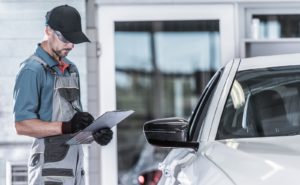Here’s What You Need To Know About Car Recalls
June 15th, 2020 by Fix Auto USA

“Does my car have a recall?” It’s a question that keeps many drivers up at night. If your car has been recalled, or you suspect it has, read this blog-post for up to date information on what you should do.
We’re going to walk you through everything you need to know about car recalls, from why they’re important to what you should do if your vehicle is recalled. We’ll also throw in a few tips on specific measures you can take to help ensure you receive prompt notification in the event it happens to you.
If you discover that your car has been recalled, don’t be shocked. According to the NHTSA, more than 29 million cars were recalled in 2018. The previous year, there were 900 recalls affecting more than 42 million vehicles.
Car recalls happen once a manufacturer realizes that one of its models has a safety-related defect, or it is out of compliance with a federal safety regulation. At that point, the carmaker would issue a notice informing all owners of that car model that there is a recall. These recalls can include numbers of safety-related factors, including steering, tires, brakes, seat belts, ignition switch, or airbags, among other possibilities.
What is a recall on a car?
Essentially, a car recall means that you need to bring your car into a dealer or auto shop for repair work, which in nearly all cases will be done free of charge. One exception is if your vehicle is more than ten years old, in which case the auto maker is not compelled to fix your car free of charge, but will often do so anyway to keep you a happy customer.
The National Highway Traffic Safety Administration (NHTSA), which establishes rules for reporting safety defects, states that “it is expected that manufacturers issue their owner notification letters within 60 days of making a safety defect or noncompliance decision.” Automakers usually send recall notifications to the address found on state vehicle registrations, which is another reason to ensure you update your vehicle registration information should you move or change your address.
What to do if my car is recalled?
If you receive a recall letter, be sure to read it carefully and thoroughly. The letter should provide a detailed description of the safety issue and any warning signs you should be aware of. It should also explain how to go about scheduling an appointment with a local dealer to have the problem repaired, and advise you if the issue is of such urgency that you should stop driving your car immediately.
If the letter does not address how serious the defect is, contact the auto manufacturer and ask them if your car is too dangerous to drive. If you’re having difficulty getting in touch with the manufacturer and the dealer, you may file a complaint with the NHTSA.
Does my car have a recall?
Some drivers worry, what if they never received the notice in the first place? There are steps you can take to help ensure you receive the notice when it is issued.
For starters, register your new or used car with the manufacturer, so they can promptly alert you when a recall is issued. The NHTSA’s rules state manufacturers must send you notice by mail, so be sure to notify the manufacturer of any change to your address.
If you have reason to believe that your car has been recalled, but you’ve yet to receive notice, call the manufacturer or a local authorized dealer for an update. If you discover a safety defect with your vehicle that has not been acknowledged by the automaker, you can notify the NHTSA and file a complaint. If enough drivers file a similar complaint, the NHTSA may follow up with an investigation and issue its own recall.
The NHTSA recommends searching its database for safety issues and recalls a couple of times each year to see if your car has been flagged. You’ll need to input your 17-character Vehicle Identification Number (VIN), which is located on your car’s registration card and can also be found on the lower-left section of your car’s windshield. The database will indicate if your vehicle was recalled in the past 15 years and never repaired, as well as current vehicle safety recalls from most major auto, motorcycle, and truck manufacturers. You can also sign up for NHTSA’s car recalls email notification system.
What is a recall on a car that is used?
While there is a federal law stating that new cars cannot be sold if they’ve been recalled and not repaired, there is no similar protection for the consumer when it comes to used cars. Dealers or owners are not legally obligated to search the NHTSA database to see if a given car has been recalled before they sell it to you. For used cars, the burden of responsibility is on you to do your research and check for recalls before signing any paperwork.
To summarize: “What to do if my car is recalled?” is a question on many drivers’ minds. If you suspect your car is the subject of a manufacturer safety recall, stay calm. Millions of car recalls happen every year for a host of different reasons. Check with the automaker or dealer to confirm any recall, or contact the NHTSA.
Once you receive formal notice in the mail, read the letter closely. Does the letter indicate that a safety defect poses an immediate risk and that you should cease driving your car immediately? Either way, follow the instructions outlined in the letter. Typically, you will be instructed to make an appointment to get your vehicle repaired, and usually without incurring any extra expense.
Whatever the case may be, take action as soon as possible. Any delay could put yourself, as well as your passengers and other drivers on the road, in harm’s way.
This blog post was contributed by Fix Auto Alameda, a leading industry expert and collision repair shop servicing the South Oakland area including Alameda and Bay Farm Island.
Welcome to
Fix Auto USA
We are the premier independent body shop network delivering world-class customer service and high-quality collision repairs across the U.S.
Learn About Us





